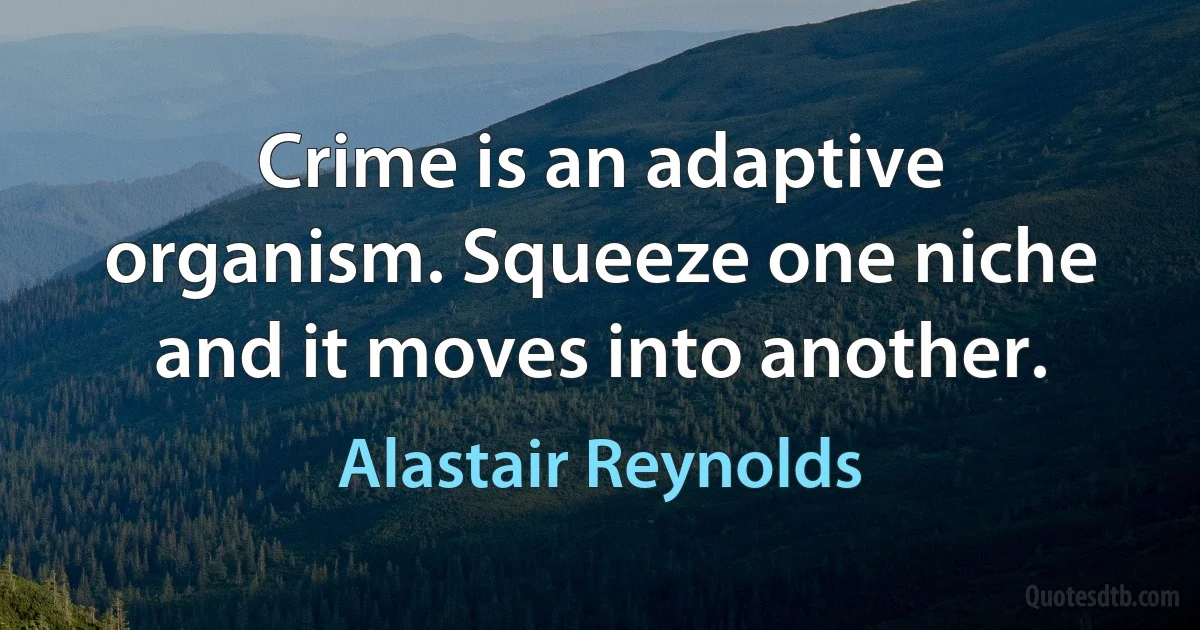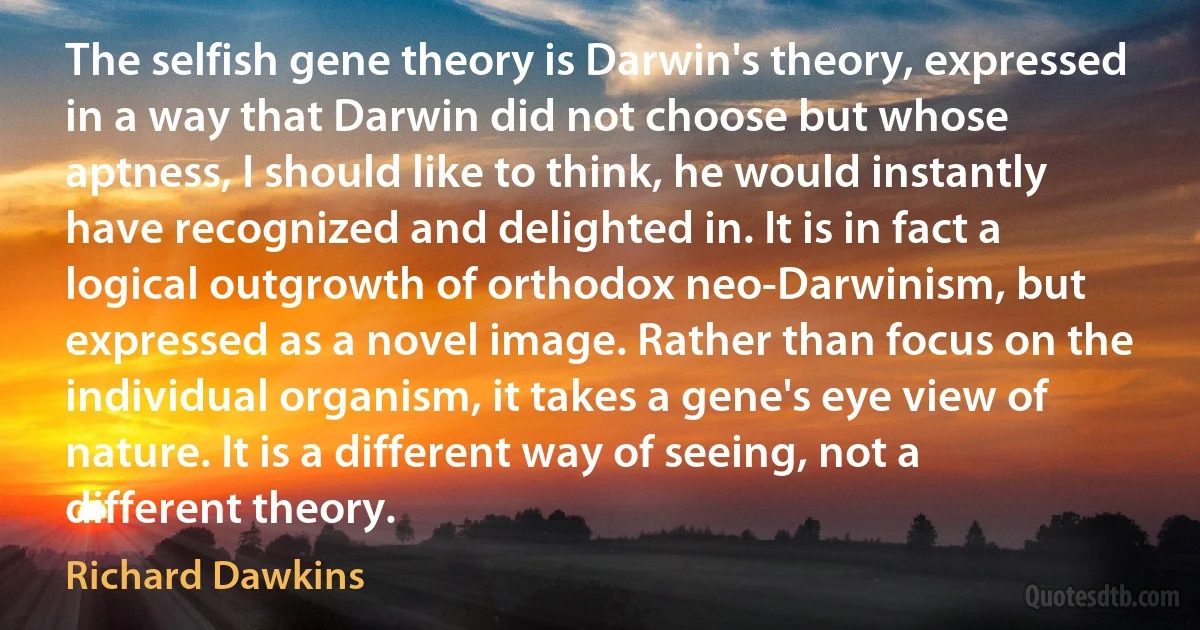Organism Quotes - page 6
Spencer "was incapable", our critic haughtily re marks, "of discerning the difference between a homogeneity in matter, necessarily and blindly tending toward a heterogeneity,, and such a law of organism [sic], progress, and growth as requires a spiritual intelligence to originate and maintain it." Perheps he was a poor man! or perhaps he thought he had better discern and formulate progress where he could do it to the best advantage, and leave the postulating of spiritual intelligences to those who had a greater talent than he for building in the region of the unverifiable.

Noah Porter
We sat on a crate of oranges and thought what good men most biologists are, the tenors of the scientific world - temperamental, moody, lecherous, loud-laughing, and healthy. [...] Your true biologist will sing you a song as loud and off-key as will a blacksmith, for he knows that morals are too often diagnostic of prostatitis and stomach ulcers. Sometimes he may proliferate a little too much in all directions, but he is as easy to kill as any other organism, and meanwhile he is very good company, and at least he does not confuse a low hormone productivity with moral ethics.

John Steinbeck
A new consciousness is developing which sees the earth as a single organism and recognizes that an organism at war with itself is doomed. We are one planet. One of the great revelations of the age of space exploration is the image of the earth finite and lonely, somehow vulnerable, bearing the entire human species through the oceans of space and time.

Carl Sagan
The bourgeois is about to leave the historical stage. In its place will come the class of productive workers, the working class, that has been up until today oppressed. It is beginning to fulfill its political mission. It is involved in a hard and bitter struggle for political power as it seeks to become part of the national organism. The battle began in the economic realm; it will finish in the political.

Joseph Goebbels
Socialism is the doctrine of liberation for the working class. It promotes the rise of the fourth class and its incorporation in the political organism of our Fatherland, and is inextricably bound to breaking the present slavery and regaining German freedom. Socialism, therefore, is not merely a matter of the oppressed class, but a matter for everyone.

Joseph Goebbels
Government is actually the worst failure of civilized man. There has never been a really good one, and even those that are most tolerable are arbitrary, cruel, grasping and unintelligent. Indeed, it would not be far wrong to describe the best as the common enemy of all decent citizens. But there will be small hope of gaining adherents to this idea so long as government is thought of as an independent and somehow super-human organism, with powers, rights, and privileges transcending those of any other human aggregation.

H. L. Mencken
With very slight straining of equivalents, Thomas might now be written thus:-
By the term God, is meant a Prime Mover which supplies all energy to the universe, and acts directly on man as well as on all other creatures, moving him as a mechanical motor might do; but man, being specially provided with an organism more complex than the organisms of other creatures, enjoys an exceptional capacity for reflex action,- a power of reflexion,- which enables him within certain limits to choose between paths; and this singular capacity is called free choice or free-will. Of course, the reflexion is not choice, and though a man's mind reflected as perfectly as the facets of a lighthouse lantern, it would never reach a choice without an energy which impels it to act. [...]
The scheme seems to differ little, and unwillingly, from a system of dynamics as modern as the dynamo.

Henry Adams
The effect of any thought is quite precise and definite and set into motion because of the nature of its own electromagnetic identity. The physical body operates within certain electromagnetic patterns and is adversely affected by others. These effects change the actual molecular structure of the cells, for better or worse, and because of the laws of attraction, habitual patterns will operate. A destructive thought, then, is dangerous not only to the present state of the organism, but is also dangerous in terms of the 'future.'

Robert Butts
The European Union is not, in fact, a union at all, but a continent-wide political coup. What began as a common market has now metamorphosed by stealth into a supranational political dictatorship, a parasitical organism living on the backs of the European nation states, sucking their lifeblood and slowly killing them off; a bureaucratic tyranny that wants to "harmonize" out of existence the national identities that have made Europe a continent of genuine diversity and a cultural crucible whose values have shaped the entire western world. But they want to put a stop to all that in the European Union of Soviet Socialist Republics, and this is why European laws are never enacted in response to any kind of organic need in society, but as top-down directives intended to impose indiscriminate uniformity for its own sake.

Pat Condell
There are two ways of considering society. According to some, the development of human associations is not subject to providential, unchangeable laws. Rather, these associations, having originally been organized in a purely artificial manner by primeval legislators, can later be modified or remade by other legislators, in step with the progress of social science. In this system the government plays a preeminent role, because it is upon it, the custodian of the principle of authority, that the daily task of modifying and remaking society devolves.According to others, on the contrary, society is a purely natural fact. Like the earth on which it stands, society moves in accordance with general, preexisting laws. In this system, there is no such thing, strictly speaking, as social science; there is only economic science, which studies the natural organism of society and shows how this organism functions.

Gustave de Molinari
With the development of the human race (and perhaps a little earlier), a new structure emerges, which we can call know-what. This consists of the structures in the nervous system which presumably map into some kind of images in the of the 'mind', which also map into structure in the 'real world', whatever that is. Know-what is very different from know-how. The fertilized egg certainly has the know-how to make whatever organism it knows how to make, but it is very doubtful that it knows what it is doing. The remarkable thing about know-what is that it creates know-how, as we see with the fantastic burgeoning of human artifacts under the influence of a science-based technology. Science, fundamentally, deals with know-what and this enormously increases know-how.

Kenneth Boulding
I must also call your attention to the fact that it is crucial for my viewpoint that human behavior is to a large extent charged with a considerable amount of energy, but that in contrast to Freud I do not consider this energy to be sexual, but the vital energy within any organism which, according to biological laws, gives man the desire to live, and that means to adapt himself to the social necessities of his society. To go back to what I consider to be the misunderstanding, it has never been my position that society only deforms or manifests that which is already there. If we make the distinction between human necessities in general and human desires in particular then indeed, society creates particular desires which, however, follow the general laws of the necessities rooted in human nature.

Erich Fromm
Standard economists don't seem to understand exponential growth. Ecological economics recognizes that the economy, like any other subsystem on the planet, cannot grow forever. And if you think of an organism as an analogy, organisms grow for a period and then they stop growing. They can still continue to improve and develop, but without physically growing, because if organisms did that you'd end up with nine-billion-ton hamsters. There is a great video on this.

Robert Costanza
In business, the followers are the customers. To produce these customers, the entire corporation must be viewed as a customer-creating and customer satisfying organism. Management must think of itself not as producing products but as providing customer creating value satisfactions. It must push this idea (and everything it means and requires) into every nook and cranny of the organization.

Theodore Levitt
The fallacy of genetic determinism is to suppose that the genes "make" the organism. It is a basic principle of developmental biology that organisms undergo a continuous development from conception to death, a development that is the unique consequence of the interaction of the genes in their cells, the temporal sequence of environments through which the organisms pass, and random cellular processes that determine the life, death, and transformation of cells. As a result, even the fingerprints of identical twins are not identical. Their temperaments, mental processes, abilities, life choices, disease histories, and death certainly differ despite the determined efforts of many parents to enforce as great a similarity as possible.

Richard Lewontin



